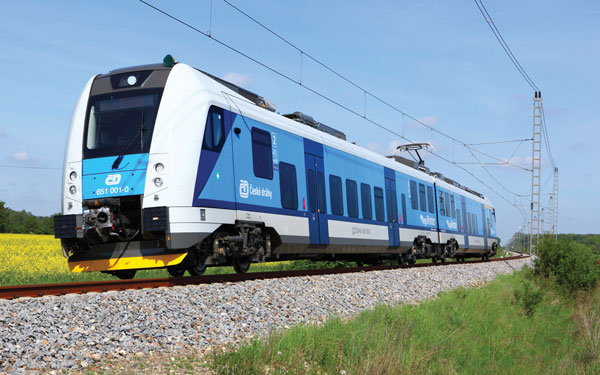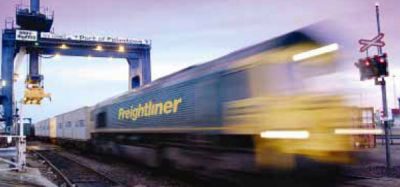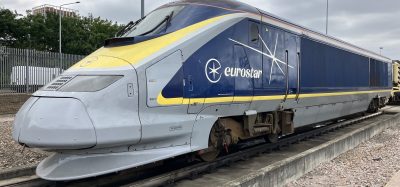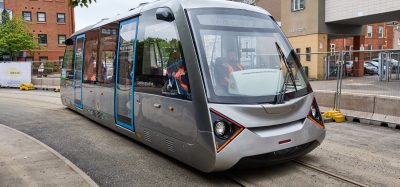Czech know-how continues to push through demanding rail markets
Posted: 4 February 2016 | Marie Vopálenská | 1 comment
With recent significant contract-wins and proven industry know-how, Marie Vopálenská, General Director of the Association of Czech Railway Industry (ACRI) believes that Czech companies are in a firm position to compete with Europe’s railway giants…


The Czech railway industry has 200 years of tradition behind it. The former Ringhoffer wagon plant in Prague, the wagon plant at Kopřivnice, the first Czech-Moravian machine works in Prague – later CKD, ŠKODA plants in Pilsen, together with a range of other producers, have always been at the top of their professions. The quality of their products is proven through large export orders.
This long-standing tradition is successfully linked with the present representatives of the Czech railway industry who do not just rely on tradition but invest significantly into the development of new products, in the use of new technologies, in the renewal of production plants, and who strive for higher labour efficiency. This has secured it a stable position within the European region.
Currently, the Association of Czech Railway Industry (ACRI) member companies employ 22,000 people in the Czech Republic, and their annual turnover is more than CZK 84 billion (approximately €3.1 billion), of which exports account for 54%. ACRI firms contribute significantly to employment and GDP creation in the Czech Republic.
ployment and GDP creation in the Czech Republic. ACRI members export their products and services, especially to the member states of the European Union, Balkan countries, Turkey and Russia. Their products, such as train control systems, locomotives and tram cars, are of the highest European standards. The Czech railway industry is at the top of its game among European manu – facturers, and Czech companies are in a position to compete with Europe’s railway giants.
Samples of recent export achievements
Among its export achievements, it is worth mentioning the recent contract for the delivery of six sets of carriages and six locomotives from ŠKODA Transportation to Germany for Deutsche Bahn Regio, plus the delivery of tram cars from the same manufacturer to a number of European and non-European cities. Furthermore, CZ Loko is busy trading with the Baltic States, Belarus and the Balkan states, and AŽD Praha is helping to modernise railways in Slovakia, the Balkans and Turkey, while railway wheels from Bonatrans can be found practically all over the world, and the same is true of anti-friction bearings from ZKL.
Rolling stock
ŠKODA Transportation will supply 39 single-deck electric units to Germany, with a total contract value in excess of €380 million. The RegioPanter-type vehicles will operate on the suburban lines of the Bavarian city of Nuremberg.
ŠKODA Transportation Group is also active and successful in the demanding Chinese market. A new tram car, type 27T, was recently introduced and is technically based on the design of the ForCity tram car family, meeting the latest technical and safety parameters. It can even be driven alternatively by battery or hydrogen fuel cells. Moreover, ŠKODA Electric is now supplying drives and motors for 40 metro sets in the Chinese city of Suzhou. This is proof that Czech know-how can push through even in the most demanding markets. The new tram car follows the successful development of these cars in the ŠKODA factory. Nowadays the company is producing tram cars for the Slovak capital city of Bratislava, and has already been completing the second contract for the Turkish city of Konya. Furthermore, the company continues to manufacture tram cars for Prague; these will feature a new design.
ŠKODA Vagonka has successfully delivered 10 electric train units manufactured for Lithuanian railways. The value of the contract exceeded two billion CZK. The type 575 bi-level train sets, manufactured by the ŠKODA Transportation subsidiary, significantly helped to innovate Lithuanian mainline railway trainsets, since the vehicles from Ostrava are operating between the cities of Vilnius and Kaunas.
ŠKODA Transportation’s new 109E Emil Zátopek locomotive has obtained approval to be put into operation on all German railways. Approval had already been obtained before this in five other countries – Austria, Poland, Hungary, Slovakia and the Czech Republic. It was just the second locomotive in the world to obtain the TSI High Speed RST certificate, necessary for the European interoperability of a high-speed railway system.
Latvian national operator LDz has selected CZ Loko to remanufacture 14 Type 2M62U twin-section diesel locomotives used by its freight subsidiary LDz Cargo. The 14 locomotives will retain only the bogies and underframes from the donor units, which will be extensively reconditioned and given new engines, traction equipment and body shells developed by the Czech builder.
Signalling
AŽD Praha – Czech producer and supplier of control and signalling equipment – has equipped the 13.3km-long loop at the Velim test centre with ETCS Level 2, and has won a significant contract with the Belarusian Railways.
Signalling equipment worth approximately 350 million CZK will be supplied by AŽD Praha for the railway line Žlobin–Gomel in Belarus; the eighth largest Czech contract for the region.
Furthermore, AŽD Praha signed a contract for work amounting to €3.1 million for delivery and installation of signalling equipment for the railway corridor Kumanovo–Beljakovce in Macedonia.
Components
In 2013, Bonatrans India Pvt. Ltd was founded. Currently, the plant for the wheel and axle machining and assembly of complete wheelsets is under construction. The opening is scheduled for mid-2016.
Development and manufacturing of brake systems for metro vehicles has been a major part of Dako-CZ activities. The company successfully completed many projects, mainly in co-operation with Siemens AG. Currently, Dako-CZ is getting ready to supply brake systems for metro vehicles in Riyadh, the capital of Saudi Arabia. Siemens AG will supply 74 Inspiro metro trains for two lines of the Riyadh metro, which will be equipped with Dako brakes.
This significant order will start in April 2016 when the first four brake units will be delivered. The Riyadh metro project will is due to open in September 2017.
Prospects for the Czech railway industry
The Czech railway industry has tremendous potential. Investments in this sector will have a ‘multiplier’ effect on domestic and economic development; they will have a favourable impact on employment, will improve the quality of transport services and lead to a higher culture of travelling, while also raising the export performance of enterprises. In general, the Czech railway network will require considerable investments over the next few years to attain the desired standard. In particular, this means investment in the development of railway infrastructure, in addition to the completion of railway corridors and the modernisation of key railway junctions.
We must not forget about regional railway lines either. To be competitive, we must fit the main corridors with the ERTMS/ETCS, modernise freight corridors passing through the Czech Republic, harmonise the costs of all types of transport, invest in the modernisation and purchase of new carriages and, last but not least, start preparations for the construction of high-speed lines that will free-up the conventional lines for freight transport to operate on.
Last but not least, there is the issue of drawing money from the funds earmarked for the current programming with the aim of maximising support for the modernisation and development of railways and rail transport in the Czech Republic.
The rail sector is very complex. Owing to its history, railways are bound by an unbelievably complicated system of regulations. In addition, railways were developing unevenly in different countries, so that the operation of railways in Europe has not, to this day, been unified, as regards both regulations and technical equipment. A help in this respect should be the adoption of Technical Specifications for Interoperability. For the time being, however, their introduction is seen rather negatively by the technical community.
Nevertheless, there are many partial areas, on which attention must be focused. But from a global point-of-view, research and developmental activities must focus on the adoption of a uniform European railway system. Such a system would make railway transport more cost efficient and more environmentally-friendly. This is a matter of principle. On the other hand, the fact is that technical branches do not have an easy life today. In comparison with other branches they are highly demanding both in the knowledge of students and the cost of the equipment in schools at different levels that would be needed. This is especially true of the railway sector. In view of the complex character of the branch, the training of new technicians takes a very long time. Therefore it would be desirable that technical education receive preferential treatment from the state authorities. This also naturally applies to the railway sector. Otherwise, there is a danger that in a few years certain professions will completely disappear, and this will have a strong negative impact on the whole sector.
However, on the other hand, a long-term development strategy cannot be built on short-term fluctuations of economic cycles. The basis for securing resources to finance railways is to include these priorities in the currently prepared operational programme for the area of transport so that the first investments in rail freight corridors and the modernisation of lines to allow trains to travel at a speed of 200km/h can be made in the 2014-2020 period, and the financing of new high-speed lines, including the fulfilment of the interoperability conditions, ensured.
The Association of Czech Railway Industry (ACRI)
ACRI represents the Czech rail manufacturing industry. The Association gathers over 50 of Czech’s leading large and SME rail supply companies, who are active in the design, manufacture, maintenance and refurbishment of rail transport systems, subsystems and related equipment. ACRI represents its members’ interests at a national level and via its membership at UNIFE, also at a European level.
Biography
Marie Vopálenská has been General Director of ACRI – the Association of Czech Railway Industry – since 2003. Her core professional experience includes an expert consultancy in areas of railway infrastructure and public transport focusing on interoperability. As graduated Informatics Engineer from CZU, Marie has worked at DHL in marketing and at Mikroelektronika as Area Sales Manager for Latin America. Between 2003 and 2009, Marie worked on a development project in Indonesia.








I am interested in railway train wheels for i want madding 20 oil tank for that i need 20rail way wheel for that hope more information with list price
009647504490282